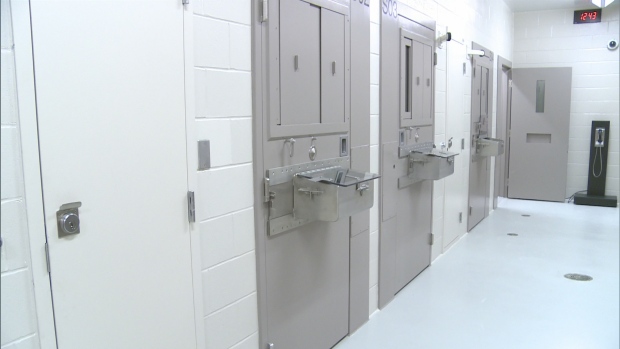KJIPUKTUK (Halifax) – Jason MacLean, president of the Nova Scotia Government and General Employees Union (NSGEU) and a former correctional officer himself, has come out swinging against the potential return of a young man from the Northeast Nova Scotia Correctional Facility in Pictou to the Nova Scotia Youth Facility in Waterville.
The 19-year old youth, jailed for a murder he committed when he was 15, joined other inmates in a violent attack on Waterville staff in September 2016 that ended up seriously hurting four staffers. He was subsequently transferred to the Pictou adult facility, where he is being kept in what amounts to solitary confinement for a year now.

As we wrote last week, Justice Anne Derrick denied a provincial request to move the youth to an adult institution. The young man wants to return to Waterville because staff there have the expertise to meet the treatment processes that are an integral part of his seven-year youth sentence.
As things stand now, the NSGEU is opposed.
“They are terrified,” MacLean told the Chronicle Herald yesterday, referring to the Waterville guards, “Everybody is worried because they are ill-equipped to deal with this offender.”
MacLean wants recommendations around staff safety issued in a government report about the incident implemented before the youth is returned, singling out low staffing levels, the need for Kevlar vests for protection, tasers, stronger doors, an X-ray machine, and a slew of other protective measures.
But there is much the Chronicle Herald didn’t report which is relevant to the story nonetheless.
The youth is currently kept in what is called the Transitional Holding Unit within the Pictou adult prison, intended for youths’ short term stays. However, after spending a year there, completely segregated from fellow prisoners, there is little that is transitional about the situation, and nothing at all that is short term.
Justice Derrick found that the Department of Justice severely neglected the young man’s court-imposed treatment plan while he was kept in solitary confinement for over a year. This occurred at a time that he needed mental health and therapeutic support more than ever before.
One witness testified that the youth has not had contact with peers and prisoners “unless he is yelling through a wall.”
It’s important to note that neither the young man’s stay in Pictou, nor the segregation aspects of that stay are part of his punishment for the Waterville violent incident. It’s just that nobody knew what to do with him, and Pictou is where the young man ended up being warehoused.
There is general agreement that solitary confinement is an extremely damaging experience for people subjected to it. Even more so for young people, according to Juan E. Méndez, the U.N. Special Rapporteur on torture, who in 2011 called for a ban of the practice.
Méndez specifically called for an absolute prohibition of solitary confinement in the case of juveniles. “The UN ultimately concluded that the practice amounts to torture, and is only exacerbated by a young person’s psychology: research has suggested that two weeks in isolation would feel like years in the mind of a teenager,” reports Desmond Cole in the Toronto Star.
That’s two weeks in isolation for a teenager. Here in Nova Scotia we are dealing with a teenager held in isolation for one entire year.
As is to be expected, that experience is taking its toll on the young man, who experienced prior mental health issues as well, being previously diagnosed with Post-Traumatic Stress Disorder and Borderline Intellectual Functioning, among other things.
“Ms. Rodgers and other members of the Treatment Team visiting Mr. B.P. noted a host of symptoms that indicate Mr. B.P. was having problems,” writes Justice Derrick in her decision. “He was experiencing difficulties with sleeping, a loss of appetite, sensitivity to light and sound, mood fluctuations – sometimes agitated, sometimes depressed, increased hostility, and an increase in paranoia and anxiety. Uncharacteristically, Mr. B.P. would at times appear particularly unkempt.”
While the youth’ already precarious mental health was further deteriorating, he was being deprived of the treatment he desperately needed at that time, evidence submitted during the court case shows.
“The transfer of Mr. B.P. to Northeast for the past twelve months has meant that he has not been receiving the intensive therapeutic intervention that Dr. Hanson’s section 34 assessment identified as essential and that was an embedded feature of Mr. B.P.’s IRCS sentence,” concludes Justice Derrick.
There are even suggestions in Justice Derrick’s decision that certain members of the IWK treatment team and prison employees went out of their way to withhold mental health supports from the youth after his move to Pictou, but that is a story all on its own.
The experience of solitary confinement and the lack treatment may well have increased the risk that the youth poses to both prison staff and fellow inmates.
To address these risks, call for more staff for Waterville, by all means, but also call for proper treatment for the youth.
And above all, call for the immediate abolishment of the barbaric practice that is solitary confinement, especially of teenagers. It only makes things worse.
If you can, please support the Nova Scotia Advocate so that it can continue to cover issues such as poverty, racism, exclusion, workers’ rights and the environment in Nova Scotia. A pay wall is not an option, since it would exclude many readers who don’t have any disposable income at all. We rely entirely on one-time donations and a tiny but mighty group of dedicated monthly sustainers.




I appreciate the honesty of Mr. MacLean in noting that the staff are “terrified” and are “ill-equipped” to work with this troubled young man. Since this is the case, the advocacy efforts that are needed to support these staff should be focused on getting them the proper training so that they can effectively do their job. A belief that not giving this youth the support that the court specified he should receive because of either inadequate staff training or inadequate staffing levels is not an inspiring argument. If there is truly a problem with staff training or staff levels, that needs to be addressed so that people can do the work they need to do.
The argument that staff feel unsafe is an argument that makes a lot more sense to me in large institutions that are chronically understaffed and that are managing a whole host of extremely unruly individuals so that simply keeping a semblance of order may be a challenge. It is considerably less compelling when applied to fears about a single individual. Staff should be trained to do their job. The reality is that when people can honestly say to themselves, “If this truly becomes a panic-type situation with this person, I have all the training I need to blow their knee out with a knee kick, slam them into a wall, and face plant them on the floor before I call for back,” they actually in a much better position to be friendly and try to work with people. People who are feeling scared of others are much less able to effectively interact with them in a calm and professional way.
These arguments about safety, particularly when applied to specific individuals rather than broader problems in the institution as a whole, are extremely uninspiring. It is reasonable to feel this way, but people should advocate for the proper training, not for continued barbaric practices. It is far more challenging to deescalate situations, empathize with people, let minor grievances slip by while focusing on the bigger picture and try to work with people than it is to learn the skills that are needed to manage danger. Both are coachable skillsets. While any given individual may be more or less skillful, as a team this is something that people should be able to learn how to do.
It would be great for more people to get the compassion, treatment and care that they need, and this begins with increasing the competence and confidence of correctional staff. I truly do care deeply about the safety of correctional staff (as well as the well-being of people in prison) which is why I find it so frustrating when they seem to be making arguments that do not actually serve them well and do not allow them to become the fullest version of the compassionate, competent, and dedicated people they can be.